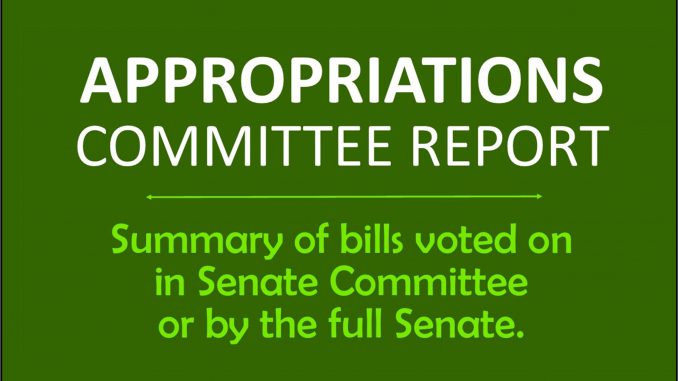
SF 2394 – Court fees;
HF 637 – Background checks with CIO and Credit Union Division.
COMMITTEE AND FLOOR ACTION:
SF 2394 relates to surcharges added to criminal penalties, court funds, civil fees, misdemeanor and felony fines, and fines associated with scheduled violations. The goal is to establish dedicated funding for the Department of Criminal Investigation crime lab, which has lacked the staff and equipment to process sexual assault kits in a timely way. In addition to providing a funding stream for the Crime Lab (estimated to be $2.1 million per year), the bill increases technology money to the Judicial Branch by $4.4 million for a total of $9.4 million. To avoid impacting the General Fund, the bill makes several changes to the Iowa Code.
The bill increases several scheduled fines; increases non-scheduled fines for simple misdemeanors, serious misdemeanors, aggravated misdemeanors, “D” felonies and “C” felonies; but reduces the criminal surcharge that is added to all criminal fines. It removes the Law Enforcement Initiative Surcharge that is added to fines for a specified group of crimes. And it increases certain civil filing fees.
The increased fines and increased civil filing fees will be deposited into the General Fund. Criminal surcharges will be distributed for specific purposes (e.g., cities and counties, victim compensation fund, and the crime lab).
The increase in criminal fines combined with reducing the criminal surcharge from 35 percent to 10 percent results in a slight increase in the total amount someone must pay for a criminal conviction with a fine.
[Committee, 3/29: short form (Excused: Danielson, Zumbach); Floor, 4/4: 45-4 (No: Bisignano, Chapman, Hogg, Taylor; Vacant: Dix)]
FLOOR ACTION:
HF 637 provides for optional background investigations for applicants with the Office of the Chief Information Officer (CIO). This includes all technology staff in state agencies. The investigation may include a work history review, financial review and a background check through the Federal Bureau of Investigation (FBI). To comply with federal guidelines, a contractor, vendor, employee or anyone else performing work for the CIO may be subject to a national criminal history check at least once every 10 years.
The CIO will bill the appropriate state agency for the criminal check. The estimated cost is nominal. There is no fiscal note on the bill.
The bill also repeals the Technology Advisory Council in 8B.8. This Council does not meet often, has poor participation and only represents six agencies. The CIO can consult all agencies and address the duties of the Technology Advisory Council.
Finally, the bill adds that a person convicted of theft, burglary, robbery, larceny, embezzlement or other crime involving breach of trust is forever disqualified from holding any position in the Credit Union Division. This is already law for the Superintendent or an employee of the Credit Union Division. The bill also adds a crime involving moral turpitude to the list that disqualifies an individual for a position. The bill allows the Credit Union Division to conduct background investigations on an applicant. This criminal history check through the FBI may be conducted every five years or whenever circumstances give reason to believe the employee has been arrested, charged or indicted for a crime listed in 533.106, subsection 6. The Credit Union Division will pay for the background checks.
An amendment was adopted on the floor to change the date for the reference to the Iowa Acts, clarify when an applicant must provide fingerprints to the Credit Union Division and make the bill effective upon enactment. This bill passed the Iowa House 98-0 on April 18, 2017.
[4/4: 49-0 (Vacant: Dix)]
